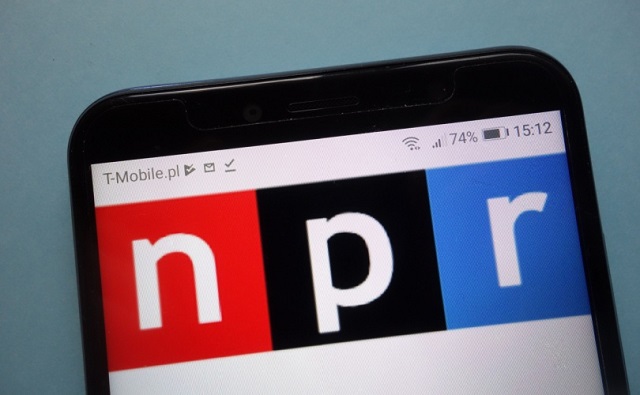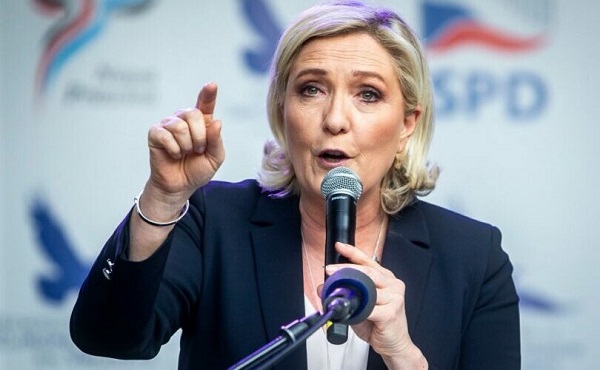Censorship Industrial Complex
NPR senior editor admits extreme bias in Russia collusion, Hunter Biden laptop, COVID coverage

From LifeSiteNews
‘There’s an unspoken consensus about the stories we should pursue and how they should be framed. … one story after another about instances of supposed racism, transphobia, signs of the climate apocalypse, Israel doing something bad, and the dire threat of Republican policies … ’
A longtime senior editor at National Public Radio (NPR) published a blistering critique of the government-funded “news” outlet’s extreme liberal bias, citing how NPR willfully “turned a blind eye” to the truth concerning alleged Russian collusion with the Trump campaign, Hunter Biden’s laptop, and the origin of COVID-19.
The Free Press’ explosive 3,500-word op-ed “I’ve Been at NPR for 25 Years. Here’s How We Lost America’s Trust.” by Uri Berliner confirms what many heartland Americans have known for decades: “An open-minded spirit no longer exists within NPR, and now, predictably, we don’t have an audience that reflects America.”
“Our news audience doesn’t come close to reflecting America,” wrote Berliner, who has worked at NPR for 25 years. “It’s overwhelmingly white and progressive, and clustered around coastal cities and college towns.”
Berliner paints a picture of an organization driven by DEI (Diversity, Equity, and Inclusion) that almost always “defaulted to ideological story lines,” and is damaged by “the absence of viewpoint diversity.”
“I looked at voter registration for our newsroom. In D.C., where NPR is headquartered and many of us live, I found 87 registered Democrats working in editorial positions and zero Republicans,” Berliner wrote. “None.”
When he presented his findings at an all-hands editorial staff meeting, suggesting “we had a diversity problem with a score of 87 Democrats and zero Republicans, the response wasn’t hostile. It was worse. It was met with profound indifference.”
Berliner draws attention to three enormous examples of NPR’s blindness regarding enormously important stories, a blindness that likely produced real-world consequences concerning the two most recent U.S. presidential elections and COVID-19 policies.
Russia collusion hoax
“Persistent rumors that the Trump campaign colluded with Russia over the election became the catnip that drove reporting,” Berliner said. “At NPR, we hitched our wagon to Trump’s most visible antagonist, Representative Adam Schiff.”
“Schiff, who was the top Democrat on the House Intelligence Committee, became NPR’s guiding hand, its ever-present muse,” he explained. “By my count, NPR hosts interviewed Schiff 25 times about Trump and Russia. During many of those conversations, Schiff alluded to purported evidence of collusion. The Schiff talking points became the drumbeat of NPR news reports.”
“But when the Mueller report found no credible evidence of collusion, NPR’s coverage was notably sparse,” Berliner confessed. “Russiagate quietly faded from our programming.”
“It is one thing to swing and miss on a major story,” Berliner allowed. “What’s worse is to pretend it never happened, to move on with no mea culpas, no self-reflection. Especially when you expect high standards of transparency from public figures and institutions but don’t practice those standards yourself. That’s what shatters trust and engenders cynicism about the media.”
Hunter Biden’s laptop ignored ‘because it could help Trump’
After the New York Post published a shocking report about the contents of Hunter Biden’s laptop just weeks before the 2020 election, “NPR turned a blind eye.”
NPR’s managing editor dismissed the important story, saying “we don’t want to waste the listeners’ and readers’ time on stories that are just pure distractions.”
“But it wasn’t a pure distraction, or a product of Russian disinformation, as dozens of former and current intelligence officials suggested,” Berliner wrote. “The laptop did belong to Hunter Biden. Its contents revealed his connection to the corrupt world of multimillion-dollar influence peddling and its possible implications for his father.”
“The laptop was newsworthy. But the timeless journalistic instinct of following a hot story lead was being squelched,” he continued. “During a meeting with colleagues, I listened as one of NPR’s best and most fair-minded journalists said it was good we weren’t following the laptop story because it could help Trump.”
NPR’s COVID-19 pandemic coverage ‘defaulted to ideological story lines’
Berliner described how NPR’s COVID-19 coverage fervently embraced a one-sided political narrative, promoting the notion that the virus came from a wild animal market in Wuhan while totally disregarding the possibility that it might have escaped from a Wuhan lab.
“The lab leak theory came in for rough treatment almost immediately, dismissed as racist or a right-wing conspiracy theory,” Berliner said. “Anthony Fauci and former NIH head Francis Collins, representing the public health establishment, were its most notable critics. And that was enough for NPR. We became fervent members of Team Natural Origin, even declaring that the lab leak had been debunked by scientists.
“Reporting on a possible lab leak soon became radioactive,” Berliner said. “But the lab leak hypothesis wouldn’t die.
“Over the course of the pandemic, a number of investigative journalists made compelling, if not conclusive, cases for the lab leak. But at NPR, we weren’t about to swivel or even tiptoe away from the insistence with which we backed the natural origin story,” Berliner wrote. “We didn’t budge when the Energy Department — the federal agency with the most expertise about laboratories and biological research — concluded, albeit with low confidence, that a lab leak was the most likely explanation for the emergence of the virus.”
“Instead, we introduced our coverage of that development on February 28, 2023, by asserting confidently that ‘the scientific evidence overwhelmingly points to a natural origin for the virus.’”
In all three cases, “politics were blotting out the curiosity and independence that ought to have been driving our work.”
DEI now trumps journalistic principles at NPR
“To truly understand how independent journalism suffered at NPR, you need to step inside the organization,” explained Berliner, who emphasized that the most damaging development at NPR over the last few years has been the absence of viewpoint diversity.
DEI considerations trumped journalistic principles. “Identity” groups within the organization — including Transgender People in Technology Throughout Public Media and NPR Pride (LGBTQIA employees at NPR) are now “given a seat at the table in determining the terms and vocabulary of our news coverage.”
“There’s an unspoken consensus about the stories we should pursue and how they should be framed. It’s frictionless — one story after another about instances of supposed racism, transphobia, signs of the climate apocalypse, Israel doing something bad, and the dire threat of Republican policies,” Berliner said. “It’s almost like an assembly line.”
Berliner concluded:
With declining ratings, sorry levels of trust, and an audience that has become less diverse over time, the trajectory for NPR is not promising. Two paths seem clear. We can keep doing what we’re doing, hoping it will all work out. Or we could start over, with the basic building blocks of journalism. We could face up to where we’ve gone wrong. News organizations don’t go in for that kind of reckoning. But there’s a good reason for NPR to be the first: we’re the ones with the word public in our name.
Censorship Industrial Complex
China announces “improvements” to social credit system

 MxM News
MxM News
Quick Hit:
Beijing released new guidelines Monday to revamp its social credit system, promising stronger information controls while deepening the system’s reach across China’s economy and society. Critics say the move reinforces the Communist Party’s grip under the banner of “market efficiency.”
Key Details:
- The guideline was issued by top Chinese government and Communist Party offices, listing 23 measures to expand and standardize the social credit system.
- It aims to integrate the credit system across all sectors of China’s economy to support what Beijing calls “high-quality development.”
- Officials claim the new framework will respect information security and individual rights—despite growing global concerns over surveillance and state overreach.
Diving Deeper:
China is doubling down on its social credit system with a newly issued guideline meant to “improve” and expand the controversial surveillance-driven program. Released by both the Communist Party’s Central Committee and the State Council, the document outlines 23 specific measures aimed at building a unified national credit system that will touch nearly every corner of Chinese society.
Framed as a tool for “high-quality development,” the guideline declares that credit assessments will increasingly shape the rules of engagement for businesses, government agencies, and individual citizens. The system, according to the National Development and Reform Commission (NDRC), has already played a role in shaping China’s financial services, government efficiency, and business environment.
Critics of the social credit system have long warned that it serves as an instrument of authoritarian control—monitoring citizens’ behavior, punishing dissent, and rewarding obedience to the Communist Party. By integrating credit data across all sectors and enforcing a “shared benefits” model, the new guideline appears to entrench, not ease, the Party’s involvement in everyday life.
Still, Beijing is attempting to temper foreign and domestic concerns over privacy. The NDRC emphasized that the system is being built on the “fundamental principle” of protecting personal data. Officials pledged to avoid excessive data collection and crack down on any unlawful use of information.
Censorship Industrial Complex
France condemned for barring populist leader Marine Le Pen from 2027 election

From LifeSiteNews
By Frank Wright
It remains to be seen how long the rule of lawfare can last against the rising demand for popular politics. The globalist remnants across the West are now liberal democracies in name only.
Marine Le Pen, the former leader of the populist French opposition party, has been sentenced to prison and barred from standing for election as president in 2027, following a court ruling against her for alleged financial crimes.
Le Pen is currently leading polls to win the presidential election, being 11 to 17 points ahead of the party of the globalist President Emmanuel Macron.
The ruling Monday on charges of “misuse of EU funds” sees Le Pen, leader of the National Rally (RN) party, facing two years’ imprisonment and a five-year ban on running for elected office. Her lawyer stated she would appeal the ruling.
Speaking a day before the verdict, Le Pen said, “There are 11 million people who voted for the movement I represent. So tomorrow, potentially, millions and millions of French people would see themselves deprived of their candidate in the election.”
She is to address the French nation in a televised statement Monday night.
Party leader Jordan Bardella responded on X, saying, “Today, it is not only Marine Le Pen who is unjustly condemned: it is French democracy that is being executed.”
Bardella has called for “peaceful mobilization” in support of Marine Le Pen, with a petition launched in protest at the “democratic scandal” of her effective cancellation as a candidate.
The RN won 33 percent of the vote in the first round of the 2024 French parliamentary elections, being the single largest party overall. It is prevented from entering government by a “cordon sanitaire” – an agreement between liberal-global and left-wing parties to “firewall” national-populists from power regardless of how many people vote for them.
The same system prevents Germany’s AfD and Austria’s FPO from governing. The AfD won 25 percent of the national vote, and the FPO came first in the Austrian elections – both held last year. More recently, Romanian presidential candidate Calin Georgescu saw his victorious presidential election canceled and him barred from running again, in what was described as a “globalist coup.”
Le Pen’s appeal would suspend the jail sentence and the fine of 100,000 euros – but would not be heard until 2026, effectively sabotaging her preparations for the 2027 election should she win. The ban takes effect when the appeal process is exhausted, meaning Le Pen is free to campaign until her appeal is heard in a year’s time.
The court ruled that Le Pen, whose RN was the single largest party in the recent French parliamentary elections, had misused 3 million euros in EU funds by paying party officials based in France.
She had told France’s La Tribune Dimanche on Saturday that “the judges have the power of life or death over our movement.”
The judges appear to have given her party a death sentence. Eight further RN members and twelve assistants were also found guilty in the same trial.
Elon Musk has warned the move will “backfire,” with globalist house magazine The Economist in agreement that “her sentence for corrupt use of EU funds could strengthen the hard right.” Its report stated, “Barring Marine Le Pen is a political earthquake for France.”
The shockwaves have reached across Europe, and around the world. Italy’s Deputy Prime Minister Matteo Salvini called the court’s ruling a “declaration of war by Brussels,” joining Dutch and Hungarian national-populist leaders Geert Wilders and Viktor Orban in condemnation of the move.
According to commentators, the legal ruling shows that the liberal-global regime is now canceling democracy. Independent journalist Michael Shellenberger said on X of worldwide globalist moves to criminalize its opponents: “This is a five alarm fire.”
Citing the lawfare undertaken against then-candidate Donald Trump, former State Department official Mike Benz described the many examples of the rule of lawfare were “a dagger in the heart of democracy”:
Donald Trump Jr. asked whether the French judiciary are “just trying to prove JD Vance was right” – referring to the vice president’s “blistering attack on European leaders” over their rising censorship and anti-democratic moves. Vance told EU and UK leaders in Munich, “Democracy rests on the sacred principle that the voice of the people matters. There is no room for firewalls. You either uphold the principle or you don’t.”
U.S. political strategist Steve Bannon also referenced populist figures facing legal persecution in his “War Room” rundown of the Le Pen affair today:
The move to legally “firewall” Le Pen has left even her political opponents disturbed, with the ruling Prime Minister Francois Bayrou reportedly “disquieted” by the verdict. Jean-Luc Melenchon, the leader of the left-liberal LFI and a determined political enemy of Le Pen, has said, “The decision to remove an elected official should be up to the people” – not the courts.
Right-populist leader Eric Zemmour, who coined the term “remigration,” warned of a “coup d’etat” of activist judges in 1997 – and said today that “everything has to change” as “it is not for judges to decide for whom the people must vote.”
Laurent Wauquiez of the conservative Les Republicains – who have also refused to work with the RN in coalition – said, “The decision to condemn Marine Le Pen is heavy and exceptional. In a democracy, it is unhealthy that an elected official be forbidden to stand for election.”
It seems this latest example of liberal-global lawfare may even see Le Pen’s party rise in the polls, with a survey today showing two-thirds of all French voters saying her ineligibility would not stop them voting for her RN party.
Nearly half of voters believe she was treated harshly “for political reasons,” with a quarter believing the move to bar her will be a “trump card” for the party overall.
Whether the move “backfires” or not, the message to Western electorates is becoming clear. You can vote for liberals of the left, right, or center – because anyone offering a real alternative will be locked out of power, or locked up in jail.
It remains to be seen how long the rule of lawfare can last against the rising demand for popular politics. After canceled elections, speech crackdowns, and criminalizing their opponents, the globalist remnants across the West are now liberal democracies in name only.
-

 2025 Federal Election1 day ago
2025 Federal Election1 day agoLiberals Replace Candidate Embroiled in Election Interference Scandal with Board Member of School Flagged in Canada’s Election Interference Inquiry
-

 espionage2 days ago
espionage2 days agoU.S. Experts Warn Canada Is Losing the Fight Against PRC Criminal Networks—Washington Has Run Out of Patience
-

 Automotive2 days ago
Automotive2 days agoTesla Vandals Keep Running Into The Same Problem … Cameras
-

 Business8 hours ago
Business8 hours agoTrump threatens additional 50% tariffs on China, urges ‘patience’
-

 Alberta8 hours ago
Alberta8 hours agoProvince introducing “Patient-Focused Funding Model” to fund acute care in Alberta
-

 Business21 hours ago
Business21 hours agoJury verdict against oil industry worries critics, could drive up energy costs
-

 Alberta1 day ago
Alberta1 day agoIs Canada’s Federation Fair?
-

 MacDonald Laurier Institute6 hours ago
MacDonald Laurier Institute6 hours agoRushing to death in Canada’s MAiD regime




